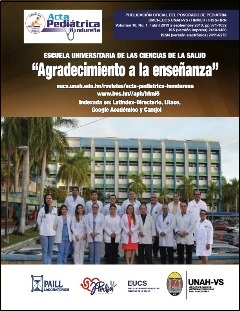Nefrotic Infant Syndrome: Clinical Case Report
DOI:
https://doi.org/10.5377/pediatrica.v9i2.8789Keywords:
Nephrotic Syndrome, Infant, proteinuriaAbstract
Nephrotic syndrome is defined by nephroticrange proteinuria (40 mg/m2/hour or protein/ refining ratio of urine 200 mg/ml or 3+ protein in urine test strip), hypoalbuminemia (25 g/L) and edema. In this clinical case it focuses on the classification, epidemiology, pathophysiology, management strategies and prognosis of infantexclusive nephrotic syndrome as etiology the most common associated with mutations in genes that encode proteins regulators and structural regulations of the glomerular filtration barrier. These mutations have been identified in: NPHS1, NHPS2, WTI, LAMB2, in Renal Biopsy the most common histological injury is diffuse mesangial Glomerulonephritis proliferative with sclerosis, usually poor prognosis and prone to treatment failure, leading to kidney failure and dialysis. A female Infant patient 17 months of age, with no history during the perinatal period, with characteristic symptoms of nephrotic syndrome, at a young age, without infectious history, presenting protein/creatino in urine positive, drawing attention to the results of renal biopsy of the same, as it comes out of the most frequent histological lesions at this age.
Downloads
7491

